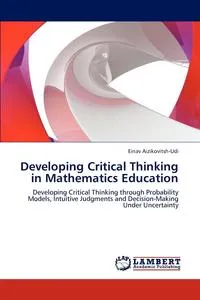Developing Critical Thinking in Mathematics Education
Автор: Einav Aizikovitsh-Udi
Переплёт: Мягкая обложка
📖 This research uncovers a potential for strengthening the status of mathematics studies in imparting higher-order thinking skills in various frameworks, in parallel with and beyond the formal program of studies. To conclude, critical thinking within the framework of mathematics education does not develop spontaneously but requires effort. It is not algorithmic, i.e. its patterns of thinking and action are not clear or predefined. Critical thinking skills rely on self-regulation of the thinking processes, construction of meaning, and detection of patterns in supposedly disorganized structures. Critical thinking tends to be complex and often terminates in multiple solutions that have advantages and disadvantages, rather than a single clear solution. It requires the use of multiple, sometimes mutually contradictory criteria, and frequently concludes with uncertainty.
Мнения
